Chapter 6
Conflict
and Controversy
As soon as "Emergency!"
began to appear as a weekly series, the LA County Fire Department
started receiving phone calls and visitors from all over the
country. We hosted fire chiefs and city managers, medical
doctors, public health directors, volunteer ambulance attendants
and citizen activists. Most of them wanted to know if the TV
series accurately portrayed our fire department and its rescue
service. After they saw that it was for real, many of the
visitors wanted to know how they could construct such a system in
their towns.
During 1972 and '73, much of my
on-duty time was spent hosting visitors and answering inquisitive
letters and phone calls. As I went about the business of
coordinating the paramedic program and its expansion, I really
had no time to be a tour guide. So I took the out-of-town
visitors with me almost everywhere I went. At meetings with
hospital administrators, or noontime presentations to service
clubs, or medical-legal lectures for paramedic trainees, or
viewing "dailies" at Universal Studios, I would often
have from one to three guests. They saw it all and heard it all,
including some of the conflict and discord that goes along with
making things happen fast in government.
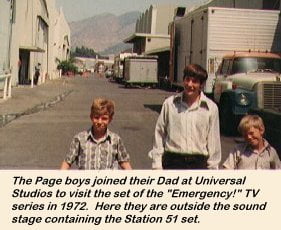 Clearly, the favorite activity for my
tag-along guests was a trip to see "Emergency!" being
filmed, either on location or in a soundstage at Universal.
Clearly, the favorite activity for my
tag-along guests was a trip to see "Emergency!" being
filmed, either on location or in a soundstage at Universal.
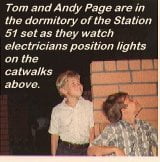 Twenty-five years later, I still encounter
people - in places like Rochester, Phoenix, and Kalamazoo -- who
remind me of the day they visited us in Los Angeles and I took
them with me to the studio.
Twenty-five years later, I still encounter
people - in places like Rochester, Phoenix, and Kalamazoo -- who
remind me of the day they visited us in Los Angeles and I took
them with me to the studio.
One of the biggest questions in
the minds of many of our visitors was whether the firefighters in
their towns would be willing or able to be trained as paramedics.
It seemed that in some parts of the country firefighters resisted
any responsibility for medical calls. "We hired on to fight
fires, not handle sick calls," was a commonly heard excuse
in some areas. I had little patience for that kind of attitude
and sent some of my visitors home with a challenge to their local
fire departments.
Also, during 1972, I wrote my
first article for a fire service magazine. The article was
titled, "Why Firefighters?" I submitted it to Dick
Friend's office before sending it to the magazine. Dick sent it
up through channels. Sixty days later, I had heard nothing from
the fire chief's office so I mailed the article to Fire Command
magazine at the National Fire Protection Association. It was
promptly published.
Through "Emergency!" I
had seen and felt the power of the television medium. The article
in Fire Command magazine introduced me to the power of the
printed word. The topic of EMS in the fire service was
controversial at that time and my article was unequivocal.
Throughout the country, those who agreed with me used the article
as a tool of persuading others. Those who disagreed with me saw
the article as dangerous heresy. Without intending to, I had
become one of the more controversial figures in the American fire
service. I wore the mantle with pride, because I knew that the
lives of countless human beings were at stake.
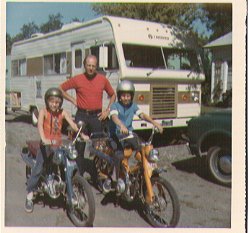 In February 1973, I moved into an apartment
next door to my law office in Covina. On weekends, I would try to
do something with my boys. Meanwhile, I had purchased a second
motorhome, a Condor, which I rented to Universal Studios. It was
used by Randy and Kevin when they were on location. When the
second season of "Emergency!" ended in the summer of
'73, there was a hiatus. I bought dirt bikes for Tom and Andy and
we took a vacation to Washington State in the Champion motorhome
(with the bikes trailered behind it).
In February 1973, I moved into an apartment
next door to my law office in Covina. On weekends, I would try to
do something with my boys. Meanwhile, I had purchased a second
motorhome, a Condor, which I rented to Universal Studios. It was
used by Randy and Kevin when they were on location. When the
second season of "Emergency!" ended in the summer of
'73, there was a hiatus. I bought dirt bikes for Tom and Andy and
we took a vacation to Washington State in the Champion motorhome
(with the bikes trailered behind it).
We traveled to a lake in Eastern
Washington where my family vacationed when I was 12. That was
where I first swam in a lake, operated an outboard motor, went
fishing, camped out under the stars. I had some powerful memories
of that place and I was trying to share them with my sons. It is
said that one can never repeat such an experience. Supposedly, it
all looks different through adult eyes, and that time distorts or
magnifies the memories. That wasn't true in the summer of 1973.
The lake was just as I remembered it, and we had a wonderful
time.
Out of
Clout
Back in LA after the vacation, I
went to a dinner meeting of the Chief Officers Club. That’s
an organization of all chief officers in the LA County Fire
Department. Three or four times a year, they have an event
consisting of golf during the day, and dinner and drinks in the
evening. I didn’t have time to play golf but I usually
attended the dinner. As I recall, the dinner was held at a big
restaurant in the suburban community of Downey. After dinner,
most everybody gathered in the bar for drinks. One by one, they
left for home until the last two remaining chiefs were Fire Chief
Richard Houts and me.
casino en línea en México.
Several weeks earlier, I had
objected to a scene in one of the "Emergency!" scripts.
I thought it reflected poorly on our personnel. My objections
were ignored. Then, I objected again after the scene had been
filmed. Again, I was ignored. I knew my clout was gone. I wrote a
memo to Chief Houts, thanking him for the opportunity to
represent the department in creation of the series and resigning
from my position as chief technical consultant. He ignored the
memo, sending word back to me through Dick Friend that he had
never appointed me to the position in the first place. That hurt.
At the Chief Officers Club
dinner, Dick Houts had a driver to get him home safely and he was
imbibing more than usual. It was close to midnight and, as we sat
alone at the bar, I took advantage of his condition and asked him
why he seemed so hostile to me. He told me that for a long time,
almost every problem that arrived in his office had my name on
it. "Your name is mud," he said, "and you
shouldn’t bother to take any more promotional exams."
That really hurt.
Sixteen years after Richie
Lawrence first showed me how to loop a hydrant, I had become my
fire chief’s biggest problem. I had thumbed my nose at
organizational politics and the chain of command, and I had
driven my career into a brick wall. For the next several weeks, I
recalled thousands of situations where I’d been faced with
the dilemma: "Should I do what I know must be done and ask
forgiveness later, or should I ask for permission and then make
excuses while waiting for the higher-ups to make a
decision." Finally, I decided I would not have done things
differently.
About that time, I was given
an opportunity to travel to Asheville, North Carolina, and speak
at the annual convention of that state’s Association of
Rescue Squads. I’d never been east of the Mississippi River,
so I arranged to drive a rental car from Asheville up the East
Coast to Washington, Baltimore, Philadelphia, New York and Boston
after the convention.
My hosts in Asheville treated
me royally. Everybody was interested in the
"Emergency!" series and the LA County Fire Department.
I spoke at several workshops and then gave the banquet speech at
the Oak Park Inn. Afterwards, a representative of the
Governor’s office approached me. "We have new
legislation and funding to create a statewide emergency medical
services program in all one hundred counties of North
Carolina," he advised. "We’re looking for someone
who can put it all together for us. Would you be
interested?"
Obviously I was flattered,
especially after being told by my chief in LA that I was his
biggest problem. But the thought of leaving my fire department
and moving to the East Coast seemed completely out of the
question. The man persisted. He asked me to spend a day in
Raleigh on my way to Washington. I did, and was intrigued by the
opportunity and grateful for the offer, but declined it.
Back in LA, the daily and
nightly grind continued. I found that my trip back east had
changed me. Most important, I had learned that several other
locales had been educated and inspired by "Emergency!"
and were making some major strides to improve EMS. In Illinois,
North Carolina and Maryland, there was a commitment from the
Governors’ offices. Necessary laws had been passed and money
had been appropriated. I caught myself wondering what it would be
like to build a program without the need to sidestep dinosaurs or
battle with resistant bureaucracies.
The week of October 7th
was typically hectic. I worked a 24-hour overtime shift in
Battalion 5 (Malibu) on Sunday. Monday the 8th
was Columbus Day, an official holiday at fire department
headquarters, but I spent eight hours there catching up with
paperwork. The rest of the week was full of meetings, answering
phone messages, writing memos, and reading reports. On the 9th,
I gave a lecture at St. Mary’s Hospital in Long Beach. On
the 10th, I met with
Heart Association officials to plan a public education campaign.
On the 11th, I
attended an organizational meeting of a new association for
paramedics. On Friday, the 12th,
I spoke at a paramedic graduation ceremony at Harbor General
Hospital. On Tuesday and Thursday nights that week, I met with
clients in my law office.
Saturday and Sunday had been
reserved for my step-son. He was 16 and socially immature. He was
active in the swim club but had no close friends. Then he took an
interest in rock climbing and joined an Explorer Post that
specialized in it. There were only about ten kids in the Post,
and they ranged in age from 13 to 17. They wanted to climb rocks
at the Joshua Tree National Monument and I offered to take them
there in the Condor motorhome.
The Condor was bigger and
more comfortable than the Champion motorhome. I had the interior
refurnished and carpeted and Randy Mantooth arranged to have an
eight-track sound system installed in it (that was the
state-of-the-art in 1973). When the Condor wasn’t being used
by the studio, I loaned it to friends and family (and used it
myself when I had the time).
A
Fateful Event
At 5:00am on the morning of
October 13, 1973, we left Hacienda Heights with six Explorers
– three boys and three girls - aboard the Condor, and the
fathers of two of the kids following us in a station wagon. After
about an hour, we stopped to buy some groceries. I planned to fix
breakfast after we got to our destination. Also, I lit the water
heater so we would have hot water when we arrived.
The next hour was uneventful.
The sun was rising from the east and we were driving into it but
the desert air was crystal clear. At about 7:30, the kids were
all in the back of the motorhome. Some were on the rear bunks and
others were sitting on couches. As we approached our destination,
I yelled, "Here it is, you guys." With that, all the
kids ran to the front of the motorhome to look through the
windshield. An instant later, we were enveloped by the pressure
of an explosion.
As the adrenalin rushed
through my body, my senses sharpened and events seemed to occur
in slow motion. I recall seeing a network of cracks appear in the
windshield and then the windshield disappeared, blown outward by
the force of the explosion. In that same instant, I felt a rush
of air and debris fly forward past my right ear. Instinctively, I
was bringing the vehicle to a halt before I could turn to look
over my shoulder. The air was filled with dust and toward the
rear of the motorhome I could see daylight.
Before I could get it to a
complete stop, kids were jumping out of the vehicle, through the
front door. I was trying to count them, expecting that we would
be in the middle of a fireball in the next second. Finally, with
the rig stopped, I rose from the driver’s seat and turned to
look for injured kids. The air was still full of dust but I could
see all the way back to where the rear of the body had blown off.
I couldn’t see any kids so I jumped out the door to get a
head count.
At that point, I saw a sight
that I will never forget. The fathers who had been following us
had seen the full dimensions of the explosion. They knew not the
fates of their children as they abandoned their car and ran
toward us. Their faces were contorted with fear and anguish.
Thirty seconds later, we all knew that we had somehow escaped a
disaster. A 40-pound back-pack that had been on one of the bunks
was found 300 feet away from the motorhome. If the explosion had
occurred while the kids congregated in the back of the vehicle,
several surely would have died.
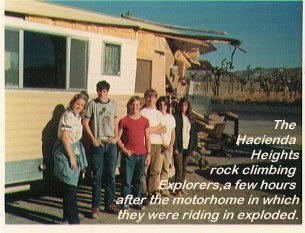 As it turned out, the only physical
injury was a small scrape on the ankle of one of the girls. The
cause of the explosion was found to be two simultaneous defects.
The thermostat on the water heater failed to shut off the flame
when it reached 140 degrees F. It continued to heat the water
till it reached the boiling point (212 degrees). At that point, a
pop-off valve on the top of the hot water tank should have
released the steam but it failed too. As a result, the water tank
became a steam pressure vessel. When water turns to steam in a
sealed container, it expands about 1,100 to one, creating enough
power to move a locomotive — or demolish a motorhome.
As it turned out, the only physical
injury was a small scrape on the ankle of one of the girls. The
cause of the explosion was found to be two simultaneous defects.
The thermostat on the water heater failed to shut off the flame
when it reached 140 degrees F. It continued to heat the water
till it reached the boiling point (212 degrees). At that point, a
pop-off valve on the top of the hot water tank should have
released the steam but it failed too. As a result, the water tank
became a steam pressure vessel. When water turns to steam in a
sealed container, it expands about 1,100 to one, creating enough
power to move a locomotive — or demolish a motorhome.
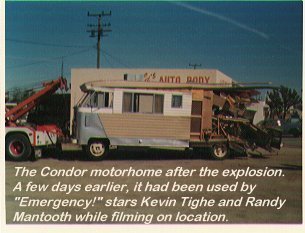 After making arrangements to get all
the kids home, and having the motorhome removed to a wrecking
yard in Yucca Valley, I had the rest of the weekend to think. I
thought about the tragedy that almost happened. I thought about
the way I’d been spending my life. I thought about all the
bridges I had burned and the anger (in myself and others) that I
was confronting every day. I realized that I was very unhappy and
that I probably wouldn’t be able to make things better in my
current situation.
After making arrangements to get all
the kids home, and having the motorhome removed to a wrecking
yard in Yucca Valley, I had the rest of the weekend to think. I
thought about the tragedy that almost happened. I thought about
the way I’d been spending my life. I thought about all the
bridges I had burned and the anger (in myself and others) that I
was confronting every day. I realized that I was very unhappy and
that I probably wouldn’t be able to make things better in my
current situation.
On Monday the 15th,
I called North Carolina and told them I’d like to talk some
more about the State EMS Chief’s job. They arranged for me
to fly to Charlotte later in the month for an interview by state
government officials. At the interview, I urged them to contact
Chief Houts and his deputy chief. "They’ll tell you
that I’ve got the energy of three men, that I drive people
crazy with new ideas, that I’m impossible to control, that I
can’t take ‘no’ for an answer, and they’d be
glad to see me go." State Senator F. O’Neil Jones
replied, "We have already talked to them, that’s
exactly what they said, and we’ve decided you’re
exactly the kind of guy we need."
November 30th
was my last day with the LA County Fire Department. On December
10th, I headed east
in my Shelby GT-350 Mustang and arrived in Raleigh on the 16th.
The boys stayed in California with their Mom. We saw each other
six to eight times a year, including summer vacations. My
stepson’s problems multiplied when he discovered marijuana.
He went to live with his father in Florida and served time there
for burglary. When his mother last saw him more than ten years
ago, he was an IV drug user. We haven’t seen or heard from
him since then and we presume he’s dead.
Tom and Andy both have done
well. After high school, each of them moved in with me.
 Tom graduated from Ithaca College in
New York with degrees in photography and cinematography. He has
been a commercial photographer in San Diego County for about ten
years. He is married with two children and lives in Vista,
California. Andy is a firefighter/paramedic in Poway (San Diego
area) and is working on his bachelors degree and studying for the
Captain’s exam on his days off. He is married with two kids
and lives in Temecula, California. Tom and Andy are both good
husbands and fathers — better than their Dad was — and
I’m very proud of them. Their mother (Pat) remarried and has
a lovely 22-year-old daughter who is attending UC Santa Barbara.
We include them in all our family get-togethers.
Tom graduated from Ithaca College in
New York with degrees in photography and cinematography. He has
been a commercial photographer in San Diego County for about ten
years. He is married with two children and lives in Vista,
California. Andy is a firefighter/paramedic in Poway (San Diego
area) and is working on his bachelors degree and studying for the
Captain’s exam on his days off. He is married with two kids
and lives in Temecula, California. Tom and Andy are both good
husbands and fathers — better than their Dad was — and
I’m very proud of them. Their mother (Pat) remarried and has
a lovely 22-year-old daughter who is attending UC Santa Barbara.
We include them in all our family get-togethers.
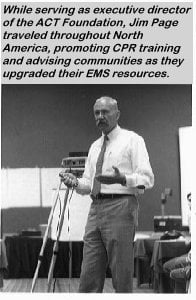 My career took me to Basking Ridge,
New Jersey in 1976, as executive director of the non-profit ACT
(Advanced Coronary Treatment) Foundation. Funded by several
pharmaceutical companies, my job was to promote CPR training
nationwide and to provide technical assistance to communities in
upgrading their EMS to the paramedic level. It was the best job I
will ever have but our success — in promoting CPR and
upgrading EMS — ultimately would bring an end to the
Foundation. In anticipation of that event we created JEMS
(Journal of Emergency Medical Services) in 1980.
My career took me to Basking Ridge,
New Jersey in 1976, as executive director of the non-profit ACT
(Advanced Coronary Treatment) Foundation. Funded by several
pharmaceutical companies, my job was to promote CPR training
nationwide and to provide technical assistance to communities in
upgrading their EMS to the paramedic level. It was the best job I
will ever have but our success — in promoting CPR and
upgrading EMS — ultimately would bring an end to the
Foundation. In anticipation of that event we created JEMS
(Journal of Emergency Medical Services) in 1980.
During those years, I
didn’t have much contact with Bob Cinader. He became a
member of the LA County Paramedic Commission and the newly-formed
(but now defunct) LA County Fire Commission. Occasionally, he
would call me out of the blue and he’d complain at great
length about something that was bugging him. He subscribed to
JEMS and he’d sometimes call in response to something
I’d written in my monthly column, "The Publisher’s
Page."
Then I heard that Bob had
died. In the January ’83 edition of JEMS, I published the
following column, titled "One of the Boys":
"It was May 11,
1971, when my path first crossed that of Robert A. Cinader.
We met at Fire Station 7 in West Hollywood. He offered me a
job, researching potential story material for a proposed
television series. It was a turning point in my life, with
both good and bad consequences.
"Bob Cinader
presented himself in a kind of stoop-shouldered indifference
to physical appearances. More often than not, his facial
expressions were a mix of frowns and scowls. In meeting or
greeting him, one could expect a report on numerous ills,
pains and inconveniences.
"I never knew
very much about his childhood or adolescence in New York. I
presume he was a kid who couldn’t master stickball but
made up for it with his mastery of the written word. Bob
Cinader was brilliant, one of the greatest minds I have ever
encountered. Still, there were many hints that he would
rather have been good at stickball.
"Bob died of
cancer last November. Probably, in his final days, he thought
about his life, its high points and lows. Certainly, his long
marriage to a lovely lady must have ranked high in his life
achievements. But I would guess that the Summer of ’71
also would be classed as one of the man’s fondest
memories. It was during the time that Bob Cinader (possibly
for the first time) became ‘one of the boys.’
"Our early
research had resulted in selling the concept of
‘Emergency!’ to NBC. Bob’s task was to develop
a script for a World Premiere TV movie, although producer
Jack Webb would get most of the credit for it. Already, there
was talk of a weekly series spinning off from the World
Premiere. Bob Cinader would be executive producer of the
one-hour shows and he had just a few weeks to get acquainted
with the world of firefighters and paramedics.
"By that time, I
was a battalion chief in a 60 sq. mi. region of South LA. For
several weeks, Bob Cinader accompanied me on my tours of
duty. At first, in deference to a film producer in their
midst, the firefighters and paramedics were still and polite.
But after a few days they reverted to form. I remember the
first time Cinader got ‘stuck in the tank’ (forced
to wash dishes) after losing a hand of firehouse poker. He
complained, and scowled, but I think he loved being treated
as one of the boys.
"As we traveled
throughout Battalion 7, visiting fire stations and hospitals,
rolling on fires and emergency calls, he became less an
attraction. The real people would greet him with a ‘Hi,
Bob.’ In the back seat of my red sedan, he would talk
endlessly between puffs on his foul smelling cigarillos. My
driver and I heard more than we ever wanted to know about the
Los Angeles Police Department and ‘Adam 12’ (which
he had produced). But as the days passed, his devotion to
paramedics and EMS became a passion that would have no rival
in his remaining years.
"As we all know,
Bob Cinader’s ‘Emergency!’ series became a
huge success. More than 120 one-hour segments were produced
over a six-year period. Some of those segments have been
re-run as many as nine times in the U.S. The show would have
gone on even longer if the principal actors hadn’t tired
of their ‘Johnnie and Roy’ roles.
"Bob
Cinader’s passion for EMS got him appointed to LA
County’s Paramedic Commission. He tended to immerse
himself in the turbulent politics of LA County’s EMS
system. His strong opinions and his dominating style produced
for him as many enemies as friends. There are those who
suggested that he was ill-prepared to design or govern a
health care system.
"Prepared or not,
there have been few people who have had more influence on any
aspect of health care. In his docu-drama approach to
presenting ‘Emergency!’ Bob Cinader elevated
America’s (indeed, the world’s) expectations. No
new concept in health care has spread as rapidly as
prehospital ALS (paramedic) services. One reason is the
public education that was accomplished through an unusual
prime-time TV series.
"He may never
have been good at stickball. But his mind, his talents, and
his dogged persistence produced a message that has profoundly
affected cities and towns throughout North America. Without
Bob Cinader’s TV show, paramedics might have become a
brief experiment in a few locations. Instead, countless lives
have been saved.
"I wish I had
known he was dying. I would have tried to let him know the
importance of his contribution. In the process, I would have
let him know that I liked him best with suds up to his elbows
— stuck in the tank as one of the boys."
When I went to work for the
ACT Foundation my secretary was an attractive divorcee named Jane
Seymour.She had two daughters about the same ages as my sons.
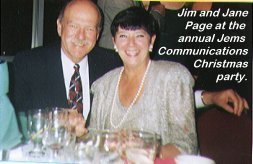 Jane and I became good friends and
worked well together, although we resisted the temptation to get
romantically involved — until 1980, that is. By 1983, the
ACT Foundation was winding down and JEMS was growing. We moved
our offices and our collective brood of kids to the San Diego
area. We were married in 1984.
Jane and I became good friends and
worked well together, although we resisted the temptation to get
romantically involved — until 1980, that is. By 1983, the
ACT Foundation was winding down and JEMS was growing. We moved
our offices and our collective brood of kids to the San Diego
area. We were married in 1984.
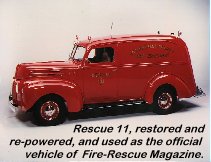 Most days since then, I have said,
"Life just doesn’t get any better than this." For
five years between ’84 and ’89, I returned to the fire
service, completing that career as the fire chief in Monterey
Park (where I started as a firefighter). Our home is in Carlsbad,
on a hill, with a view that stretches from Dana Point to La
Jolla. The only legal work I do these days is pro bono (free)
representation of paramedics who are being disciplined. In
’93, we sold Jems Communications to Mosby, a division of
Times Mirror. I have continued as publisher of both JEMS and
Fire-Rescue Magazine, a job that I love.
Most days since then, I have said,
"Life just doesn’t get any better than this." For
five years between ’84 and ’89, I returned to the fire
service, completing that career as the fire chief in Monterey
Park (where I started as a firefighter). Our home is in Carlsbad,
on a hill, with a view that stretches from Dana Point to La
Jolla. The only legal work I do these days is pro bono (free)
representation of paramedics who are being disciplined. In
’93, we sold Jems Communications to Mosby, a division of
Times Mirror. I have continued as publisher of both JEMS and
Fire-Rescue Magazine, a job that I love.
 Our
merged family is very tight-knit. One of the girls, Deborah, is a
lawyer in nearby Vista. She and her husband have two sons.
Daughter Susan is an advertising sales manager in Seattle where
she also trains horses and her husband practices law. When the
whole bunch gets together - four kids and their spouses, and the
six grandkids - it is great fun.
Our
merged family is very tight-knit. One of the girls, Deborah, is a
lawyer in nearby Vista. She and her husband have two sons.
Daughter Susan is an advertising sales manager in Seattle where
she also trains horses and her husband practices law. When the
whole bunch gets together - four kids and their spouses, and the
six grandkids - it is great fun.
Thanks for this opportunity
to share my story with "Emergency!" fans. It’s
been fun going back over all those memories, even though some of
them were pretty painful. In the end, I don’t believe I will
ever again have the opportunity to participate in anything that
will have such a positive impact on so many people.
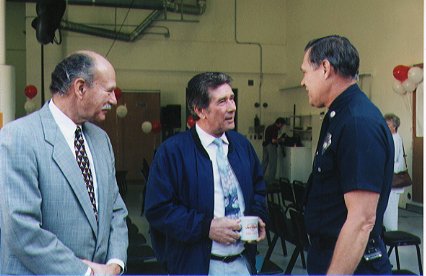
In November 1995, Universal Studios and the LA County Fire
Department jointly dedicated the new fire station on the studio grounds as
"Station 51." Attending the event were (left to right) Jim Page, Robert Fuller,
and Captain Roy Burleson, who once served as a paramedic technical advisor. (left)
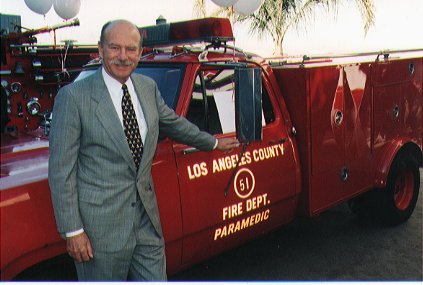
Jim Page posed for a photo with Squad 51 at the
dedication of the new Fire Station 51 at Universal Studio in
1995. (right)
Copyright 1998, James O.
Page
We'd like to thank Mr. Page for his tremendous contribution to
the page, his patience with all our questions, and loaning us his
pictures!
[Home] [People,
Places & Things]
 Clearly, the favorite activity for my
tag-along guests was a trip to see "Emergency!" being
filmed, either on location or in a soundstage at Universal.
Clearly, the favorite activity for my
tag-along guests was a trip to see "Emergency!" being
filmed, either on location or in a soundstage at Universal.
 Twenty-five years later, I still encounter
people - in places like Rochester, Phoenix, and Kalamazoo -- who
remind me of the day they visited us in Los Angeles and I took
them with me to the studio.
Twenty-five years later, I still encounter
people - in places like Rochester, Phoenix, and Kalamazoo -- who
remind me of the day they visited us in Los Angeles and I took
them with me to the studio. In February 1973, I moved into an apartment
next door to my law office in Covina. On weekends, I would try to
do something with my boys. Meanwhile, I had purchased a second
motorhome, a Condor, which I rented to Universal Studios. It was
used by Randy and Kevin when they were on location. When the
second season of "Emergency!" ended in the summer of
'73, there was a hiatus. I bought dirt bikes for Tom and Andy and
we took a vacation to Washington State in the Champion motorhome
(with the bikes trailered behind it).
In February 1973, I moved into an apartment
next door to my law office in Covina. On weekends, I would try to
do something with my boys. Meanwhile, I had purchased a second
motorhome, a Condor, which I rented to Universal Studios. It was
used by Randy and Kevin when they were on location. When the
second season of "Emergency!" ended in the summer of
'73, there was a hiatus. I bought dirt bikes for Tom and Andy and
we took a vacation to Washington State in the Champion motorhome
(with the bikes trailered behind it). As it turned out, the only physical
injury was a small scrape on the ankle of one of the girls. The
cause of the explosion was found to be two simultaneous defects.
The thermostat on the water heater failed to shut off the flame
when it reached 140 degrees F. It continued to heat the water
till it reached the boiling point (212 degrees). At that point, a
pop-off valve on the top of the hot water tank should have
released the steam but it failed too. As a result, the water tank
became a steam pressure vessel. When water turns to steam in a
sealed container, it expands about 1,100 to one, creating enough
power to move a locomotive — or demolish a motorhome.
As it turned out, the only physical
injury was a small scrape on the ankle of one of the girls. The
cause of the explosion was found to be two simultaneous defects.
The thermostat on the water heater failed to shut off the flame
when it reached 140 degrees F. It continued to heat the water
till it reached the boiling point (212 degrees). At that point, a
pop-off valve on the top of the hot water tank should have
released the steam but it failed too. As a result, the water tank
became a steam pressure vessel. When water turns to steam in a
sealed container, it expands about 1,100 to one, creating enough
power to move a locomotive — or demolish a motorhome. After making arrangements to get all
the kids home, and having the motorhome removed to a wrecking
yard in Yucca Valley, I had the rest of the weekend to think. I
thought about the tragedy that almost happened. I thought about
the way I’d been spending my life. I thought about all the
bridges I had burned and the anger (in myself and others) that I
was confronting every day. I realized that I was very unhappy and
that I probably wouldn’t be able to make things better in my
current situation.
After making arrangements to get all
the kids home, and having the motorhome removed to a wrecking
yard in Yucca Valley, I had the rest of the weekend to think. I
thought about the tragedy that almost happened. I thought about
the way I’d been spending my life. I thought about all the
bridges I had burned and the anger (in myself and others) that I
was confronting every day. I realized that I was very unhappy and
that I probably wouldn’t be able to make things better in my
current situation.  Tom graduated from Ithaca College in
New York with degrees in photography and cinematography. He has
been a commercial photographer in San Diego County for about ten
years. He is married with two children and lives in Vista,
California. Andy is a firefighter/paramedic in Poway (San Diego
area) and is working on his bachelors degree and studying for the
Captain’s exam on his days off. He is married with two kids
and lives in Temecula, California. Tom and Andy are both good
husbands and fathers — better than their Dad was — and
I’m very proud of them. Their mother (Pat) remarried and has
a lovely 22-year-old daughter who is attending UC Santa Barbara.
We include them in all our family get-togethers.
Tom graduated from Ithaca College in
New York with degrees in photography and cinematography. He has
been a commercial photographer in San Diego County for about ten
years. He is married with two children and lives in Vista,
California. Andy is a firefighter/paramedic in Poway (San Diego
area) and is working on his bachelors degree and studying for the
Captain’s exam on his days off. He is married with two kids
and lives in Temecula, California. Tom and Andy are both good
husbands and fathers — better than their Dad was — and
I’m very proud of them. Their mother (Pat) remarried and has
a lovely 22-year-old daughter who is attending UC Santa Barbara.
We include them in all our family get-togethers. My career took me to Basking Ridge,
New Jersey in 1976, as executive director of the non-profit ACT
(Advanced Coronary Treatment) Foundation. Funded by several
pharmaceutical companies, my job was to promote CPR training
nationwide and to provide technical assistance to communities in
upgrading their EMS to the paramedic level. It was the best job I
will ever have but our success — in promoting CPR and
upgrading EMS — ultimately would bring an end to the
Foundation. In anticipation of that event we created JEMS
(Journal of Emergency Medical Services) in 1980.
My career took me to Basking Ridge,
New Jersey in 1976, as executive director of the non-profit ACT
(Advanced Coronary Treatment) Foundation. Funded by several
pharmaceutical companies, my job was to promote CPR training
nationwide and to provide technical assistance to communities in
upgrading their EMS to the paramedic level. It was the best job I
will ever have but our success — in promoting CPR and
upgrading EMS — ultimately would bring an end to the
Foundation. In anticipation of that event we created JEMS
(Journal of Emergency Medical Services) in 1980. Jane and I became good friends and
worked well together, although we resisted the temptation to get
romantically involved — until 1980, that is. By 1983, the
ACT Foundation was winding down and JEMS was growing. We moved
our offices and our collective brood of kids to the San Diego
area. We were married in 1984.
Jane and I became good friends and
worked well together, although we resisted the temptation to get
romantically involved — until 1980, that is. By 1983, the
ACT Foundation was winding down and JEMS was growing. We moved
our offices and our collective brood of kids to the San Diego
area. We were married in 1984. Most days since then, I have said,
"Life just doesn’t get any better than this." For
five years between ’84 and ’89, I returned to the fire
service, completing that career as the fire chief in Monterey
Park (where I started as a firefighter). Our home is in Carlsbad,
on a hill, with a view that stretches from Dana Point to La
Jolla. The only legal work I do these days is pro bono (free)
representation of paramedics who are being disciplined. In
’93, we sold Jems Communications to Mosby, a division of
Times Mirror. I have continued as publisher of both JEMS and
Fire-Rescue Magazine, a job that I love.
Most days since then, I have said,
"Life just doesn’t get any better than this." For
five years between ’84 and ’89, I returned to the fire
service, completing that career as the fire chief in Monterey
Park (where I started as a firefighter). Our home is in Carlsbad,
on a hill, with a view that stretches from Dana Point to La
Jolla. The only legal work I do these days is pro bono (free)
representation of paramedics who are being disciplined. In
’93, we sold Jems Communications to Mosby, a division of
Times Mirror. I have continued as publisher of both JEMS and
Fire-Rescue Magazine, a job that I love. Our
merged family is very tight-knit. One of the girls, Deborah, is a
lawyer in nearby Vista. She and her husband have two sons.
Daughter Susan is an advertising sales manager in Seattle where
she also trains horses and her husband practices law. When the
whole bunch gets together - four kids and their spouses, and the
six grandkids - it is great fun.
Our
merged family is very tight-knit. One of the girls, Deborah, is a
lawyer in nearby Vista. She and her husband have two sons.
Daughter Susan is an advertising sales manager in Seattle where
she also trains horses and her husband practices law. When the
whole bunch gets together - four kids and their spouses, and the
six grandkids - it is great fun.
